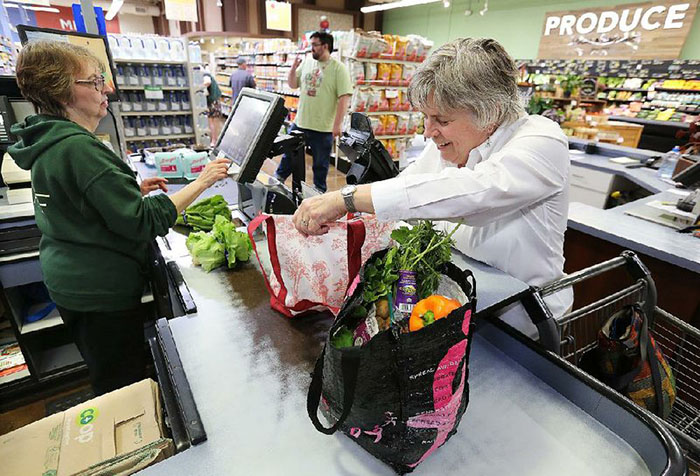Fayetteville looking into feasibility of ban on single-use plastics
by Stacy Ryburn | June 2, 2019 at 2:46 a.m.
Photo by David Gottschalk
Arkansas Democrat-Gazette
FAYETTEVILLE — City administrators want to curtail using plastic bags and polystyrene foam containers, but they plan to hear from restaurant and grocery store owners first.
The City Council on Tuesday will consider exploring the city’s regulation of single-use, or disposable, plastics. The measure would allow the city staff and members of the resident-led Environmental Action Committee to spend time researching potential fees or bans on the material and to speak with business owners.
City Attorney Kit Williams said the resolution would be purely exploratory, if it passes. The administration wants a picture of how much taxpayer money is spent to clean up plastic bags and polystyrene containers from public areas in the city, and to use that information as justification for some type of regulation, he said.
“We really need some idea,” Williams said. “Something more than just common knowledge — that plastic bags are in fact a litter problem that is, in reality, costing our city money to pick them up.”
The council during its May 21 meeting passed an ordinance keeping the city from buying polystyrene foam products and prohibiting vendors operating on city property from using the material, commonly known as Styrofoam.
Council Member Teresa Turk sponsored the ordinance, which will take effect in November. She also is backing the plastics resolution and said she wants to take the same deliberate approach with it.
“My background is in science,” Turk said. “I really would like to study the problem and make sure we understand from start to finish some of the actions we might take.”
Boston, Seattle, Portland, Ore., and about 200 other cities either ban plastic bags or charge fees associated with them, according to Reuse This Bag, a supplier of reusable and recycled bags. The average plastic bag picked up at the grocery store is used for about 12 minutes but can stay in the environment for up to 1,000 years, the company’s website says.
California, Hawaii and New York are the only states with statewide bans on plastic bags, according to the National Conference of State Legislatures.
Maine about a month ago became the first state to ban single-use containers made of polystyrene foam. Maryland, Oregon, Vermont and Connecticut are considering state bans, according to The Associated Press.
Whatever action Fayetteville takes, Turk said, she wants it to fit the city and not come as a shock to businesses. She said she’s not as concerned with major stores such as Walmart getting on board, since other cities have adopted single-use plastic regulations and the company has complied. Turk said she’s more worried about the impact on smaller, locally owned businesses.
“In my ideal worldview, it would be that every restaurant here goes to something that could be recyclable, and we wouldn’t have to put any legislation in place. They would just do it voluntarily,” she said. “Maybe that could work here, but it usually doesn’t work that way.”
Steve Clark, president of the Fayetteville Chamber of Commerce, commended Turk and the city for taking the initiative to help the environment. However, many questions will need to be addressed, he said.
For instance, if a fee is placed on the consumer using a plastic bag, the question becomes how to implement that and how much the fee would cost, Clark said. Every cent can matter to a low-income resident, he said.
Another question is how the city would enforce a polystyrene ban, and what alternatives would be allowed, he said.
“My concern is we can’t just grab the first idea that seemed to work in some community 20 times larger than we are and say if it worked for them it must work for us,” he said. “We really have to say we want to obtain this goal. Let’s find the best, most efficient and most effective way to do that, that doesn’t have unintended consequences on any group.”
Some businesses, such as Ozark Natural Foods, have measures to reduce single-use plastics. The store stopped offering plastic bags more than a decade ago and now keeps paper bags up front, said Lisa Garrett, marketing director.
The store encourages customers to provide their own bags for shopping. However, some of the products it offers come in plastic containers from the manufacturer, Garrett said.
Shoppers can also buy certain items in bulk, reducing the amount of waste that typically would come from packaging, she said.
“What we can do, we definitely do do. We put a lot of thought into our sustainability efforts and try to do the best that we can,” Garrett said. “If there’s an option available to us, we’re at least going to do the research and see if it’s something we can begin to take part in.”
Employees from the city’s departments for sustainability and recycling, and trash collection would join the Environmental Action Committee in outreach and research if the resolution passes. There’s no timetable for recommendations, Williams said.
The committee started eyeing plastic bags and polystyrene foam containers months ago, chairman Andrew Miles said. Turk happened to have the same idea when she became the City Council representative on the committee, he said.
Miles said the committee plans to take a project-management approach to reaching out to businesses while coordinating with the city. Education will be a key component of the outreach effort, showing businesses the alternatives to single-use plastic products that are out there, he said.
“As far as the actual work to be done, besides the legislative side of things, you actually have to go out there and change some hearts and minds,” Miles said. “Some people want to do this, they just don’t know how.”
Metro on 06/02/2019

